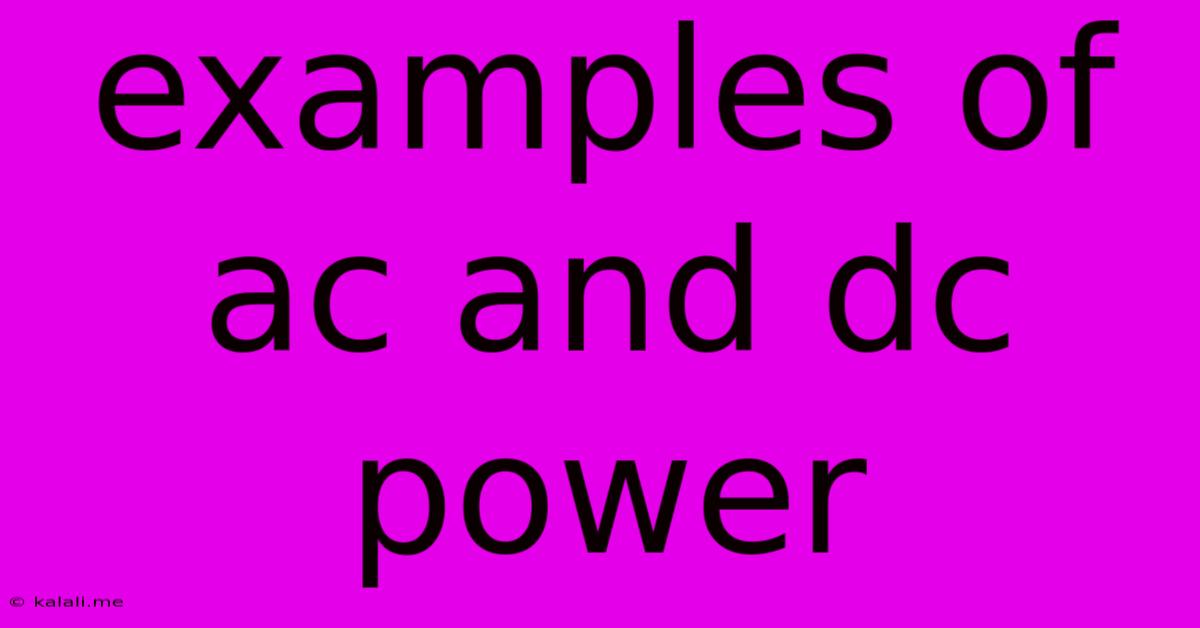Examples Of Ac And Dc Power
Kalali
Jun 12, 2025 · 3 min read

Table of Contents
Examples of AC and DC Power: Understanding the Difference
This article explores the fundamental differences between alternating current (AC) and direct current (DC) power, providing clear examples of where each is commonly used. Understanding these distinctions is crucial for anyone working with electricity or simply curious about the technology powering our world. The key difference lies in the direction of electron flow: DC flows in one direction, while AC periodically reverses direction. This seemingly simple distinction leads to significant practical implications in power generation, transmission, and application.
Examples of Direct Current (DC) Power
Direct current, characterized by a constant flow of electrons in a single direction, is prevalent in various applications:
-
Batteries: Most portable devices, from smartphones and laptops to flashlights and electric vehicles, rely on DC power supplied by batteries. These batteries provide a consistent voltage and current flow. Different battery chemistries (like lithium-ion, alkaline, and lead-acid) offer varying voltage levels, but all deliver DC power.
-
Solar Panels: Solar cells convert sunlight directly into DC electricity. This DC power then often needs to be converted to AC for use in a typical household power grid. However, many smaller applications, like solar-powered garden lights or calculators, utilize the DC power directly.
-
Small Electronic Devices: Many small electronics, including calculators, digital clocks, and some toys, operate directly on low-voltage DC power.
-
Power Supplies: These are crucial components converting AC mains power to the lower DC voltages required by many electronic devices. Think of the power brick for your laptop or the adapter for your phone. These power supplies use rectifiers to convert AC to DC.
-
Electric Vehicles (EVs): While the charging infrastructure may use AC, the batteries in electric vehicles store and deliver DC power to the motor.
Examples of Alternating Current (AC) Power
Alternating current, with its periodically reversing electron flow, is the dominant form of power for widespread distribution:
-
Household Power Outlets: The electrical outlets in your home deliver AC power, typically at 120V in North America and 230V in many other parts of the world. This is the standard power used by most household appliances.
-
Power Grids: Electricity generated in power plants (using various methods like fossil fuels, nuclear power, or renewable sources) is transmitted across vast distances using high-voltage AC lines. The high voltage minimizes energy loss during transmission.
-
Large Appliances: Most large household appliances, such as refrigerators, washing machines, and dryers, operate on AC power.
-
Industrial Machinery: Factories and industrial settings heavily rely on AC power for running heavy machinery and equipment.
-
Street Lighting: Most streetlights use AC power to provide illumination to public spaces.
Key Differences Summarized
| Feature | AC | DC |
|---|---|---|
| Electron Flow | Periodically reverses direction | Flows in one direction |
| Voltage | Varies over time | Remains relatively constant |
| Transmission | Efficient over long distances | Less efficient over long distances |
| Applications | Power grids, household appliances | Batteries, electronics, EVs |
Understanding the differences between AC and DC power is essential for comprehending the fundamentals of electrical systems. From the small scale of electronic devices to the vast networks of power grids, both AC and DC play crucial roles in our modern world. This knowledge helps us appreciate the ingenuity and complexity of our electrical infrastructure and the constant advancements in power generation and distribution technologies.
Latest Posts
Latest Posts
-
Sample Letter Of Authorization Letter To Claim
Jun 13, 2025
-
Which Word Is An Antonym Of Adept
Jun 13, 2025
-
Which Of The Following Is Covalent Compound
Jun 13, 2025
-
Elements In Groups 3 12 Are Called
Jun 13, 2025
-
How Much Is 200c In F
Jun 13, 2025
Related Post
Thank you for visiting our website which covers about Examples Of Ac And Dc Power . We hope the information provided has been useful to you. Feel free to contact us if you have any questions or need further assistance. See you next time and don't miss to bookmark.